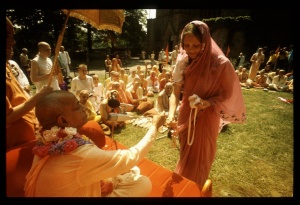CC Adi 17.105 (1975): Difference between revisions
(Vanibot #0027: CCMirror - Mirror CC's 1996 edition to form a basis for 1975) |
(Vanibot #0019: LinkReviser - Revise links, localize and redirect them to the de facto address) |
||
| Line 2: | Line 2: | ||
<div style="float:left">'''[[Sri Caitanya-caritamrta (1975)|Śrī Caitanya-caritāmṛta (1975)]] - [[CC Adi (1975)|Ādi-līlā]] - [[CC Adi 17 (1975)|Chapter 17: The Pastimes of Lord Caitanya Mahāprabhu in His Youth]]'''</div> | <div style="float:left">'''[[Sri Caitanya-caritamrta (1975)|Śrī Caitanya-caritāmṛta (1975)]] - [[CC Adi (1975)|Ādi-līlā]] - [[CC Adi 17 (1975)|Chapter 17: The Pastimes of Lord Caitanya Mahāprabhu in His Youth]]'''</div> | ||
<div style="float:right">[[File:Go-previous.png|link=CC Adi 17.104 (1975)|Ādi-līlā 17.104]] '''[[CC Adi 17.104 (1975)|Ādi-līlā 17.104]] - [[CC Adi 17.106 (1975)|Ādi-līlā 17.106]]''' [[File:Go-next.png|link=CC Adi 17.106 (1975)|Ādi-līlā 17.106]]</div> | <div style="float:right">[[File:Go-previous.png|link=CC Adi 17.104 (1975)|Ādi-līlā 17.104]] '''[[CC Adi 17.104 (1975)|Ādi-līlā 17.104]] - [[CC Adi 17.106 (1975)|Ādi-līlā 17.106]]''' [[File:Go-next.png|link=CC Adi 17.106 (1975)|Ādi-līlā 17.106]]</div> | ||
{{CompareVersions|CC|Adi 17.105|CC 1975|CC 1996}} | |||
{{RandomImage}} | {{RandomImage}} | ||
==== TEXT 105 ==== | ==== TEXT 105 ==== | ||
<div class="verse"> | <div class="verse"> | ||
: | :gaṇi' dhyāne dekhe sarva-jña,--mahā-jyotirmaya | ||
:ananta vaikuṇṭha- | :ananta vaikuṇṭha-brahmāṇḍa--sabāra āśraya | ||
</div> | </div> | ||
| Line 18: | Line 17: | ||
<div class="synonyms"> | <div class="synonyms"> | ||
gaṇi'-by calculation; dhyāne—by meditation; dekhe—sees; sarva-jña—knower of everything; mahā-jyotir-maya—highly effulgent body; ananta—unlimited; vaikuṇṭha—spiritual world; brahmāṇḍa—planets; sabāra—of all of them; āśraya—shelter. | |||
</div> | </div> | ||
| Line 32: | Line 31: | ||
<div class="purport"> | <div class="purport"> | ||
Here we get some information of the Vaikuṇṭha world, or spiritual world. Vaikuṇṭha means | Here we get some information of the Vaikuṇṭha world, or spiritual world. Vaikuṇṭha means "without anxiety." In the material world, everyone is full of anxiety, but another world, where there is no anxiety, is described in the Bhagavad-gītā ([[BG 8.20 (1972)|8.20]]): | ||
:paras tasmāt tu bhāvo 'nyo | |||
:'vyakto 'vyaktāt sanātanaḥ | |||
:yaḥ sa sarveṣu bhūteṣu | |||
:naśyatsu na vinaśyati | |||
"Yet there is another unmanifest nature, which is eternal and is transcendental to this manifested and unmanifested matter. It is supreme and is never annihilated. When all in this world is annihilated, that part remains as it is." | |||
As there are many planets within the material world, there are many millions of planets, called Vaikuṇṭhalokas, in the spiritual world. All these Vaikuṇṭhalokas, or superior planets, rest on the effulgence of the Supreme Personality of Godhead. As stated in the Brahma-saṁhitā (yasya prabhā prabhavato jagad-aṇḍa-koṭi-), the Brahman effulgence emanating from the body of the Supreme Lord creates innumerable planets in both the spiritual and material worlds; thus these planets are creations of the Supreme Personality of Godhead. The astrologer saw Śrī Caitanya Mahāprabhu to be the very same Personality of Godhead. We can just imagine how learned he was, yet he was traveling door to door, just like an ordinary beggar, for the highest benefit of human society. | |||
As there are many planets within the material world, there are many millions of planets, called Vaikuṇṭhalokas, in the spiritual world. All these Vaikuṇṭhalokas, or superior planets, rest on the effulgence of the Supreme Personality of Godhead. As stated in the Brahma-saṁhitā (yasya prabhā prabhavato jagad-aṇḍa-koṭi- | |||
</div> | </div> | ||
Latest revision as of 14:18, 18 September 2020

A.C. Bhaktivedanta Swami Prabhupada
TEXT 105
- gaṇi' dhyāne dekhe sarva-jña,--mahā-jyotirmaya
- ananta vaikuṇṭha-brahmāṇḍa--sabāra āśraya
SYNONYMS
gaṇi'-by calculation; dhyāne—by meditation; dekhe—sees; sarva-jña—knower of everything; mahā-jyotir-maya—highly effulgent body; ananta—unlimited; vaikuṇṭha—spiritual world; brahmāṇḍa—planets; sabāra—of all of them; āśraya—shelter.
TRANSLATION
Through calculation and meditation, the all-knowing astrologer saw the greatly effulgent body of the Lord, which is the resting place of all the unlimited Vaikuṇṭha planets.
PURPORT
Here we get some information of the Vaikuṇṭha world, or spiritual world. Vaikuṇṭha means "without anxiety." In the material world, everyone is full of anxiety, but another world, where there is no anxiety, is described in the Bhagavad-gītā (8.20):
- paras tasmāt tu bhāvo 'nyo
- 'vyakto 'vyaktāt sanātanaḥ
- yaḥ sa sarveṣu bhūteṣu
- naśyatsu na vinaśyati
"Yet there is another unmanifest nature, which is eternal and is transcendental to this manifested and unmanifested matter. It is supreme and is never annihilated. When all in this world is annihilated, that part remains as it is."
As there are many planets within the material world, there are many millions of planets, called Vaikuṇṭhalokas, in the spiritual world. All these Vaikuṇṭhalokas, or superior planets, rest on the effulgence of the Supreme Personality of Godhead. As stated in the Brahma-saṁhitā (yasya prabhā prabhavato jagad-aṇḍa-koṭi-), the Brahman effulgence emanating from the body of the Supreme Lord creates innumerable planets in both the spiritual and material worlds; thus these planets are creations of the Supreme Personality of Godhead. The astrologer saw Śrī Caitanya Mahāprabhu to be the very same Personality of Godhead. We can just imagine how learned he was, yet he was traveling door to door, just like an ordinary beggar, for the highest benefit of human society.